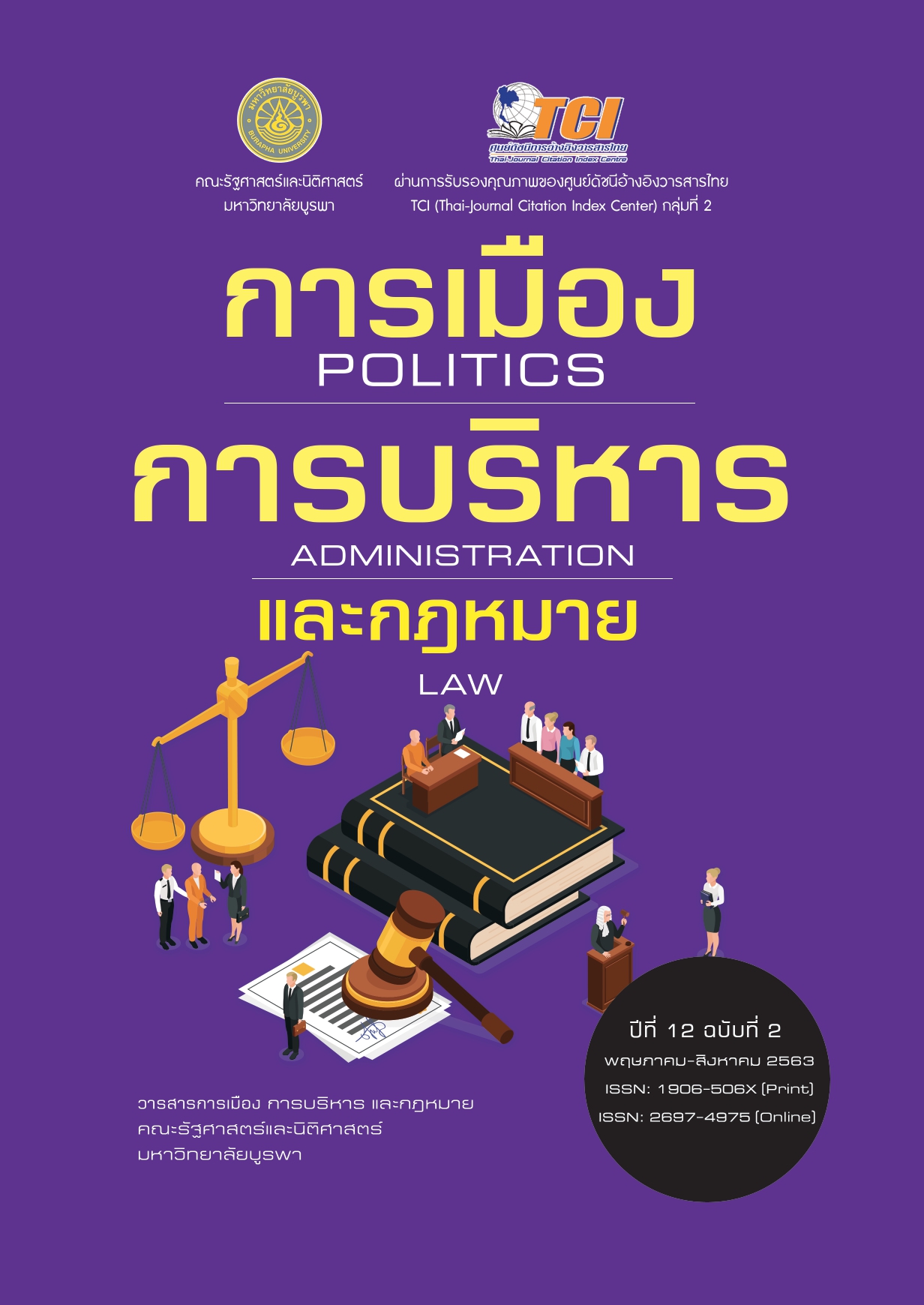การพัฒนากลยุทธ์การจัดการชุมชนแบบตอบแทนคุณระบบนิเวศ ในพื้นที่การท่องเที่ยวที่มีความหลากหลายทางชีวภาพชุมชนบางกะเจ้า
คำสำคัญ:
กลยุทธ์, การจัดการชุมชน, การตอบแทนคุณระบบนิเวศ, ความหลากหลายทางชีวภาพบทคัดย่อ
การพัฒนากลยุทธ์การจัดการชุมชนแบบตอบแทนคุณระบบนิเวศ ในพื้นที่การท่องเที่ยวที่มี ความหลากหลายทางชีวภาพชุมชนบางกะเจ้า ใช้การวิจัยเชิงคุณภาพ ประกอบด้วย การวิจัยเอกสาร การสัมภาษณ์เชิงลึก การประยุกต์วิธีการถอดบทเรียน และการใช้เทคนิคการวิจัยแบบ EDFR กลุ่มผู้ให้ข้อมูลหลัก ได้แก่ เจ้าหน้าที่ผู้ดูแลพื้นที่บางกะเจ้า ชาวบ้านในชุมชน เจ้าหน้าที่หน่วยงานภาครัฐที่ดูแลเกี่ยวกับ การท่องเที่ยว นักท่องเที่ยว นักวิชาการ และผู้มีส่วนได้ส่วนเสีย จำนวน 17 คน จากการศึกษาแนวทาง สถานการณ์ บทบาท และแนวโน้มของรูปแบบการจัดการชุมชนแบบ ตอบแทนคุณระบบนิเวศ ด้วยการใช้ชุมชนเป็นฐานเพื่อการท่องเที่ยวพื้นที่บางกะเจ้า นำไปสู่การสังเคราะห์แนวทางการพัฒนากลยุทธ์การจัดการชุมชนตามกรอบของ Town Matrix พบว่า ในด้านของกลยุทธ์เชิงรุก นั้นควรมีการกำหนดมาตรการทางสังคม กฎกติกาและกฎหมายในการการจัดการสิ่งแวดล้อม วัฒนธรรม และการท่องเที่ยวในชุมชน การสร้างความร่วมมือและการประสานแผนงานโครงการในการจัดการพื้นที่เชิงระบบนิเวศ สำหรับกลยุทธ์เชิงแก้ไข ควรมีการส่งเสริมการจัดสวัสดิการจากฐานองค์กรการเงินชุมชนในรูปแบบของการออมทรัพย์หรือการสะสมหุ้นของสมาชิกสหกรณ์เพื่อให้เกิดเป็นกองทุนหมุนเวียนในชุมชนและนำผลกำไรที่เกิดจากการหมุนเวียนเงินออมมาจัดสวัสดิการแก่ชุมชน ส่งเสริมการเพิ่มคุณค่าและมูลค่าของทรัพยากรชุมชนสู่การเป็นสินค้าและบริการฐานอัตลักษณ์ของชุมชน และหากพิจารณาถึงกลยุทธ์เชิงป้องกัน เห็นว่าควรมีการเสริมสร้างบรรทัดฐานทางสังคม เพื่อสร้างค่านิยม ความเชื่อ และส่งเสริมจริยธรรม กฎ ระเบียบของชุมชน และการส่งเสริมการสร้างภาคีความร่วมมือด้านการอนุรักษ์ทรัพยากรในชุมชน ตลอดจนกลยุทธ์เชิงรับ ควรมีการตอบโต้แบบทันท่วงที เพื่อส่งเสริมการแก้ปัญหาได้ตรงจุดตามที่ต้องการเนื่องจากเป็นการบริหารจัดการเพื่อคลี่คลายสถานการณ์วิกฤติให้อยู่ในภาวะปกติโดยเร็วที่สุด รวมถึง การบรรเทาและฟื้นฟู และการส่งเสริมให้มีกระบวนการเรียนรู้ด้านสิ่งแวดล้อมให้กับเยาวชน โดยการแทรกเนื้อหาและกิจกรรมเสริมที่เน้นการปลูกฝังจิตสำนึกความรับผิดชอบต่อสังคมด้านสิ่งแวดล้อม เป็นต้น และจากการศึกษาองค์ประกอบของกลยุทธ์การจัดการชุมชนแบบตอบแทนคุณระบบนิเวศ ในพื้นที่การท่องเที่ยวที่มีความหลากหลายทางชีวภาพชุมชนบางกะเจ้า ด้วยเทคนิคการวิจัยแบบ EDFR สามารถจำแนกองค์ประกอบของกลยุทธ์ออกเป็น 9 มิติ ได้แก่ มิติวิถีชีวิตชุมชน มิติความรับผิดชอบต่อสังคมของผู้ประกอบการ มิติด้านการจัดการหน่วยวิจัยชุมชน มิติด้านความเป็นอนุรักษ์นิยมของชุมชน มิติด้านกฎหมาย หรือระเบียบแนวปฏิบัติในการบริหารจัดการ มิติด้านการท่องเที่ยวเชิงอนุรักษ์ มิติด้านการผลิตและการบริโภคที่เป็นมิตรกับสิ่งแวดล้อมอย่างยั่งยืน มิติด้านการจัดการระบบนิเวศ และมิติด้านการจัดการภาวะคุกคาม
เอกสารอ้างอิง
จุติชัย ด้วงลำพันธ์, เยาวนิตย์ ธาราฉาย, เกรียงศักดิ์ ศรีเงินยวง, ศิริชัย หงษ์วิทยากร และปรัชมาศ ลัญชานนท์. (2556). การพัฒนาพื้นที่สีเขียวภายใต้แนวคิดชุมชนนิเวศ กรณีศึกษา: เทศบาลเมืองแม่โจ้ อำเภอสันทราย จังหวัดเชียงใหม่. การประชุมวิชาการและนำเสนอผลงานวิชาการเครือข่ายงานวิจัยนิเวศวิทยาป่าไม้ประเทศไทย ครั้งที่ 2 ณ มหาวิทยาลัยแม่โจ้ จ.เชียงใหม่ ระหว่างวันที่ 24-26 มกราคม พ.ศ. 2556.
จุมพล พูลภัทรชีวิน. (2548). การปฏิบัติการวิจัยด้วย EDFR. วารสารบริหารการศึกษา มหาวิทยาลัยขอนแก่น, 1(2), 19-31.
เจนจีรา อักษรพิมพ์. (2560). กลยุทธ์การจัดการท่องเที่ยวโดยชุมชนแบบยั่งยืนในจังหวัดนครราชสีมา.วารสารวิจัยและพัฒนา วไลยอลงกรณ์ ในพระบรมราชูปถัมภ์, 12(3), 141-154.
ชายชาญ ปฐมกาญจนา และนรินทร์ สังข์รักษา. (2558). แนวทางการส่งเสริมการท่องเที่ยวเชิงวัฒนธรรมแบบมีส่วนร่วมของชุมชนตลาดบางหลวง อำเภอบางเลน จังหวัดนครปฐม. Academic Services Journal Prince of Songkla University, 26(1).
ไชยรัตน์ เจริญสินโอฬาร. (2543). วาทกรรมการพัฒนา: อำนาจ ความรู้ ความจริง เอกลักษณ์ และความเป็น อื่น. กรุงเทพฯ: สำนักพิมพ์วิภาษา.
ธงชัย สันติวงษ์. (2539). การบริหารงานบุคคล. กรุงเทพฯ: ไทยวัฒนาพานิช
นิโรธ เดชกำแหง. (2558). การพัฒนากลยุทธ์การจัดการคุณภาพขององค์การธุรกิจการจัดงานแสดงสินค้าในประเทศไทย. ปริญญาปรัชญาดุษฎีบัณฑิตสาขาวิชาการจัดการ, บัณฑิตวิทยาลัย, มหาวิทยาลัยศิลปากร
นิตยา งามยิ่งยง และละเอียด ศิลาน้อย. (2560). แนวทางการพัฒนาการท่องเที่ยวอย่างยั่งยืน ชุมชนบริเวณริมฝั่งคลองดาเนินสะดวก ในจังหวัดสมุทรสาครและจังหวัดราชบุรี. วารสารวิทยาลัยดุสิตธานี, 11(1).
บุญมาก ศิริเนาวกุล พีรณัฐ โชว์สูงเนิน และสุชาย ธนวเสถียร. (2556) แผนยุทธศาสตร์การท่องเที่ยวจังหวัดราชบุรีและดัชนีชี้วัด. Stamford Journal, 5(1), 51-56.
พจนา สวนศรี. (2546). คู่มือการจัดการท่องเที่ยวโดยชุมชน. กรุงเทพฯ: โครงการท่องเที่ยวเพื่อชีวิตและธรรมชาติ.
มิ่งสรรพ์ ขาวสอาด และ อัครพงศ์ อั้นทอง. (2554). การวิเคราะห์อุปสงค์การท่องเที่ยวไทยในระยะยาว.วารสารเศรษฐศาสตร์ธรรมศาสตร์, 29(2).
มิ่งสรรพ์ ขาวสอาด, อัครพงศ์ อั้นทอง, พรทิพย์ เธียรธีรวิทย์ กุลดา เพ็ชรวรุณ และนุกุล เครือฟู. (2556). เศรษฐศาสตร์ว่าด้วยการท่องเที่ยว. โครงการเมธีวิจัยอาวุโส, สำนักงานกองทุนสนับสนุนการวิจัย (สกว.). เชียงใหม่: สถาบันศึกษานโยบายสาธารณะ
ลลิดา ขุนทอง. (2550). แนวทางการวางแผนพัฒนาการท่องเที่ยวเชิงบริการทางการแพทย์ในจังหวัดภูเก็ต. หลักสูตรปริญญาวิทยาศาสตรมหาบัณฑิต, สาขาวิชาการวางแผนและการจัดการการท่องเที่ยวเพื่ออนุรักษ์สิ่งแวดล้อม, มหาวิทยาลัยศรีนครินทรวิโรฒ.
วรางคณา ผลประเสริฐ. (ม.ป.ป). แนวคิดเกี่ยวกับการจัดการเชิงกลยุทธ์. วันที่ค้นข้อมูล 10 กุมภาพันธ์ 2560, เข้าถึงได้จาก www.stou.ac.th/Schools/Shs/upload/หน่วยที่1ชุดวิชา%2058708.pdf
ศักดิ์ศรี รักไทย. (2560). การประเมินมูลค่าทางเศรษฐศาสตร์ของบริการระบบนิเวศพื้นที่ชุ่มน้ำ. วารสารวิทยาศาสตร์บูรพา, 22(3).
ศรีณัฐ ไทรชมภู และบุญเกียรติ ไทรชมภู. (ม.ป.ป.). การท่องเที่ยวเชิงนิเวศบนฐานความหลากหลายทางชีวภาพและภูมิปัญญาท้องถิ่น เพื่อการพัฒนาเศรษฐกิจในพื้นที่คุ้งบางกะเจ้า อำเภอพระประแดง จังหวัดสมุทรปราการ. วารสารวิชาการมหาวิทยาลัยราชภัฏพระนคร, 6(2).
สมชาย ภคภาสน์วิวัฒน์. (2540). กลยุทธ์การแข่งขันของธุรกิจ. กรุงเทพฯ: มติชน.
สมยศ นาวีการ. (2539). ทฤษฎีองค์กร. กรุงเทพฯ: สํานักพิมพ์สามัคคีสาร (ดอกหญ้า) จํากัด.
เสนาะ ติเยาว์. (2543). หลักการบริหาร. กรุงเทพฯ: โรงพิมพ์มหาวิทยาลัยธรรมศาสตร์.
สำนักงานนโยบายและแผนทรัพยากรธรรมชาติและสิ่งแวดล้อม กระทรวงทรัพยากรธรรมชาติและสิ่งแวดล้อม. (2561). แผนจัดการคุณภาพสิ่งแวดล้อมพ.ศ. 2560 – 2564. กรุงเทพฯ: กระทรวงทรัพยากรธรรมชาติและสิ่งแวดล้อม.
สำนักงานพัฒนาเศรษฐกิจจากฐานชีวภาพ (องค์การมหาชน). (2560). โครงการต้นแบบการเสริมสร้างศักยภาพขององค์กรปกครองส่วนท้องถิ่นในการป้องกันและใช้ประโยชน์จากความหลากหลายทางชีวภาพอย่างยั่งยืนในภูมินิเวศของประเทศไทย (SLBT). กรุงเทพฯ: สำนักงานพัฒนา เศรษฐกิจจากฐานชีวภาพ (องค์การมหาชน).
สำนักวางแผนการเกษตร ทรัพยากรธรรมชาติ และสิ่งแวดล้อม: สำนักงานคณะกรรมการพัฒนาการเศรษฐกิจและสังคมแห่งชาติ. (2554). การจ่ายค่าตอบแทนการให้บริการของระบบนิเวศ (Payment for Ecosystem Service: PES). เอกสารสรุปการประชุม The 3rd South-East Asia Workshop on Payment for Ecosystem Service (PES) - Investment in Natural Capital for Green Growth 12-15 มิถุนายน 2554 ณ เมืองบันดา อาเจะห์ ประเทศอินโดนีเซีย.
อรัญยา ปฐมสกุล วิศาล ศรีมหาวโร และสมคิด รัตนพันธุ์. (2560). การพัฒนาการท่องเที่ยวเชิงนิเวศของชุมชน: กรณีศึกษาตำบลท่าชนะ อำเภอท่าชนะ จังหวัดสุราษฎร์ธานี. วารสารราชภัฏสุราษฎร์ธานี, 4(1).
อุดม เชยกีวงศ์ วิมล โรจนพันธุ์ และประชิต สกุณะพัฒน์. (2548). การท่องเที่ยวเชิงนิเวศ. กรุงเทพฯ: สำนักพิมพ์แสงดาว.
Alkhafaji, A. F. (2003). Strategic Management Formulation. Implementation and Control in a Dynamic Environment. New York: Haworth Press.
Bettinghaus, E. P., & Cody, M. J. (1994). Persuasive Communication. New York: Holt, Rinehart and Winston.
Cohen, J. M., & Uphoff, N. (1997). Rural Development Participation. Concepts and Measures for Project Design, Implementation and Evaluation. Ithaca, New York: Cornell University.
Hampton, D. R. (1986). Management (3rd ed.). New York: Mc Graw-Hill International Editions.
Denzin, N. K. (1978). The Research Act: A Theoretical Introduction to Sociological Methods. New York: McGraw-Hill.
Earle, E. M., Craig, G. A., & Gilbert, F. (1943). The Makers of Modern Strategy. Military Thought from Machiavelli to Hitler.
Evans, G. (2005). Measure for measure: evaluating the evidence of culture’s contribution to regeneration. Urban Studies, 42(5/6), 1-25.
Gezici, F., & Kerimoglu, E. (2010). Culture, tourism and regeneration process in Istanbul. International Journal of Culture Tourism and Hospitality Research, 4(3), 252-265.
Steiner, G. A. (1997). Strategic Planning. Free Press Paperbacks.
Jensen, S. S. (2007). The roles of culture and creativity within urban development strategies: Scandinavian cities. Centre for Strategic Urban Research, CSB, 8(2007).
Sebele, L. S. (2010). Community-based tourism ventures, benefits and challenges: Khama Rhino Sanctuary Trust, Central District, Botswana. Tourism Management, 31, 136–146.
Porter, M. E. (1980). Competitive strategy. New York: The Free Press.
Nation TV. (2559). “บางกะเจ้า"โมเดลพื้นที่คุ้มครอง สวล. วันที่ค้นข้อมูล 10 กุมภาพันธ์ 2561, เข้าถึงได้จาก http://www.nationtv.tv/main/content/378507639/
Pearce, J. A., & Robinson, R. B. (2009). Strategic Management: Formulation, Implementation, and Control. New York: McGraw-Hill Higher Education.
Kotler, P. (2003). Marketing management (11th ed.). New Jersey: Pearson Education.
Pitts, R. A., & Lei, D. (2000). Strategic Management: Building and Sustaining Competitive Advantage (2nd ed.). U.S.A.: South-Western Publishing.
Robbins, S. P., & Coulter, M. (1999). Management (6th ed.). Upper Saddle River, NJ: Prentice-Hall.
Scherhorn, J. R. (2002). Management (7th ed.). New York: John Wiley and Sons.
Skinner, B. F. (1983). A matter of consequences. New York: Knopf.
McMillan, T. T. (1971). The Delphi Technique. paper presented at annual meeting of California Junior College Association Commission on Research and Development (3 May 1971) Monterrey California .
Tosun, C. (2006). Expected nature of community participation in tourism development. Tourism Management, 27(3), 493–504.
Mortberg, U. M., & Balfors, B., & Knol, W. C. (2007). Landscape ecological assessment: A tool for integrating biodiversity issues in strategic environmental assessment and planning. Journal of Environmental Management, 82(4), 457-470.
Sasidharana, V., Sirakayab, E., & Kerstetter, D. (2002). Developing countries and tourism ecolabels. Tourism Management, 23, 161–174.
Wheelen, T. J., & Hunger, D. (2004). Strategic Management and Business Policy (8th ed.). New Jersey: USA: Pearson Education Inc.






